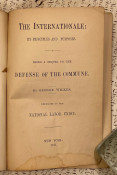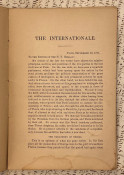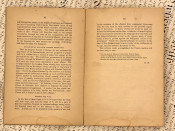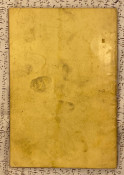AMERICAN SOCIALIST in Paris. - George WILKES (1817-1885).
The Internationale: Its Principles and Purposes. Being a Sequel to the Defense of the Commune. By George Wilkes, Dedicated to the National Labor Union. New York: 1871. Octavo (7 1/8 x 4 7/8in; 182 x 124mm). Pp. [1-]4-23[-24]. (Light dampstain to the lower blank margins). Cream-glazed wrappers, titled on the upper cover (light soiling, small splits to backstrip).
Very rare: early socialism in America. George Wilkes was a strong supporter of the Paris Commune and felt able to justify all of their actions: ‘The Communists on all occasions, exhibited integrity. Morality, moderation, and respect for human life, while the track of their opponents was red with ruthless slaughter and characterized at every step by perfidy’ (Wilkes}, and the ‘United States, Wilkes feared, was suffering from the same ills as Europe, plus a few that were all their own’ (P.M. Katz From Appomattox to Montmartre: Americans and the Paris Commune, p.57). 'The National Labor Union was the first national labor federation in the United States. Founded in 1866 and dissolved in 1873, it paved the way for other organizations, such as the Knights of Labor and the AFL (American Federation of Labor).' (wikipedia).
Wilkes “was an American journalist and newspaper editor. A native of New York, Wilkes became a journalist and after losing a libel case was imprisoned in New York City's jail; his imprisonment led him to write a pamphlet on the jail's conditions in 1844. The next year, Wilkes and a friend started publishing National Police Gazette, a newspaper dealing with crime reporting and other sensationalistic topics. In 1856 Wilkes bought a sporting newspaper called Spirit of the Times, which he had previously worked for. After selling the Gazette, Wilkes continued to publish and edit the Spirit until his death in 1885. Wilkes also wrote a couple of books on non-sporting topics as well as introducing pari-mutuel betting into the United States. …
When Wilkes returned from California to New York City, he began to work for William T. Porter at Porter's newspaper Spirit of the Times. Porter sold the paper in 1856 to Wilkes, who retained Porter on the newspaper's staff until Porter's death in 1858. Wilkes, however, renamed the paper to Porter's Spirit of the Times, a title it retained until 1859. In September 1859, Abraham C. Dayton, who had previously worked for the Spirit, left the paper and because he had purchased a share of the paper at one point from Porter, began publishing a paper he called Porter's Spirit of the Times. Dayton got a court order preventing Wilkes from using Porter's name, so Wilkes changed the name of his paper to Wilkes' Spirit of the Times, while Dayton continued to publish Porter's Spirit of the Times. Dayton was only able to publish until August 1861, however, as Wilkes drove the other paper out of business. Wilkes owned the surviving paper until his death in 1885.
Under Wilkes' ownership, the Spirit, which previously had covered mainly sporting events, expanded its coverage to include political matters. When the American Civil War began in 1861, Wilkes covered the battles also. He was present at the First Battle of Bull Run and wrote an account of it. He continued to serve as a correspondent throughout the war and contracted the kidney disease which he later died from during his war journalism. Wilkes also used literary feuds with other newspapers, both in and out of the sporting press, to help his subscription rates. After the Civil War, Wilkes' Spirit was one of the three leading newspapers in New York City. Two, including the Spirit, of the three were mainly devoted to horse racing – the other being The Turf, Field and Farm by Sanders D. Bruce …
Wilkes was active in Republican Party political affairs and ran for the United States Congress against James Brooks, losing the race in 1870, with Brooks receiving 12,845 votes and Wilkes 7149 votes. Wilkes, along with John Chamberlain and Marcus Cicero Stanley, introduced pari-mutuel betting in the United States. Wilkes also was active in promoting boxing, acting as the promoter for some prizefights. Wilkes also became involved in an effort to colonize Baja California, becoming trustee of a colonizing company in 1867. In 1877 he published his last work, Shakespeare from an American Point of View, which reflected his lifelong interest in William Shakespeare. This work was revised twice, with the third edition appearing in 1882.
Married twice, Wilkes had two adopted children, George and Alicia. He also had a sister, Catherine, and a brother, Henry. He died on September 23, 1885 in New York City, and was buried on September 26, 1885. It is claimed that Tsar Alexander II of Russia in 1870 inducted him into the Order of St Stanislas for Wilkes' promotion of a railroad route from Russia through India to China. The writer of his Dictionary of American Biography entry described him as a "master of a vigorous style that exactly suited his hard truculent disposition". Patricia Cohen, author of a history of Helen Jewett's life and murder, described Wilkes' as having an "articulate wit and a talent for sarcastic social criticism" “(Wikipedia).
- Binding Condition: Acceptable
- Overall Condition: Acceptable
- Size: 7 1/8 x 4 7/8in; 182 x 124mm
- Sold By: Shadowrock Rare Books
- Contact Person: Adam Langlands
- Country: United States
- Email: [email protected]
- Telephone: 001-860-248-1547
- Preferred Payment Methods: Paypal, US$ checks and wire transfers, major credit cards through paypal
- Trade Associations: AA Approved




















